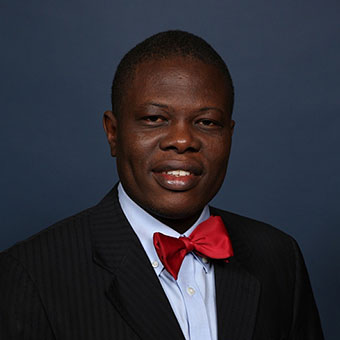Covenant University will continuously lead a revolution in cancer research by engaging local content to solve the global challenge and shall keep supporting her faculty to conduct groundbreaking research in cancer.
The Vice-Chancellor, Covenant University, Professor Abiodun H. Adebayo, gave the promise on Friday, September 24, 2021, at the virtual World Cancer Research Day seminar themed “Driving Progress against Cancer through Inclusive Research” and organised by the Covenant Applied Informatics and Communications African Centre of Excellence (CApIC-ACE).
Professor Adebayo, representing the Chancellor and Chairman, Board of Regents of the University, Dr David O. Oyedepo, said available data indicated that 10 million people died from cancer every year. According to him, at least one-third of common cancers were preventable, and up to 3.7 million lives could be saved each year by implementing appropriate resource strategies for prevention, early detection and treatment of cancer.
He noted that life years and productivity loss, together with disabilities resulting from cancer accounted for the highest economic cost on a global scale, compared to other causes of death, including infectious diseases.
The Vice-Chancellor stated that one of the most important areas was to support and promote research on the causes, prevention and early detection of cancer as a key element in controlling the disease. “This will lead towards the discovery of a cure for cancer or transforming the disease into a chronic illness. Screening aims to identify individuals with findings suggestive of a specific cancer or pre-cancer before they have developed symptoms,” he averred.
Covenant University, said Professor Adebayo, was pioneering excellence in research especially through the CApIC-ACE initiatives and the Covenant University Centre for Research Innovation and Discovery (CUCRID). He commended the efforts of the management of CApIC-ACE for initiating the seminar and awareness at the 2021 World Cancer Research Day.
The Speaker at the event, Dr Solomon Rotimi, who made a presentation titled “Driving Progress Against Cancer Through Inclusive Research”, said Africa would have to change the narrative by stepping up her game in the cancer research endeavour. He said Africa’s contribution in terms of research was among the least among the continents of the world. Africa’s low profile research, he noted, lent credence to the assertion that there would be increase in cancer incidences by 2040. According to him, Africa was projected to bear the burden of cancer by 2040, with West, Middle and East African countries having an over 100% increase in cancer.
While tracing the earliest written record of human cancer in ancient Egyptian manuscripts of the Edwin Smith and George Ebers papyri, indicated by bulging tumours of the breast and the lack of treatment, Dr Rotimi said cancer at its most basic essence was a genetic disease. He pointed out that, “Some intrinsic or extrinsic (carcinogen) factor causes a molecular assault generally leading to some type of DNA damage to lead a cell down the neoplastic pathway”.
The Speaker stated that the leading cancers in Africa included Breast, Prostate and Cervix. Recent evidence suggested that inflammation-driven cancer in Blacks was influenced by vitamin D levels, he added.
Dr Rotimi averred that cancer was a disease of the genome, not a disease of the tissue, and Genomic investigation was critical in selecting precision and tissue agnostic treatments. He said that the bane of cancer control in Africa was the lack of representation in research that provided evidence for treatment guideline.
“The use of predominantly Caucasian data for cancer control in Blacks is inadequate. Inclusivity is essential in achieving population-relevant precision medicine,” he stated.
Earlier in his opening speech, Convener of the seminar, Professor Emeka Iweala, said that September 24 of every year was set aside globally to raise awareness about the important role that cancer research and researchers played in reducing the global cancer burden by improving cancer diagnosis, treatments and management. He stated that through cancer research, cancer survival rates in some countries had increased to 50%, but it was still necessary to improve this rate.
While quoting the International Agency for Research on Cancer, Professor Iweala, who is the Director, Covenant University Centre for Research, Innovation and Discovery, said Cancer was projected to become the leading cause of death worldwide, leading to 9.6 million deaths per year, with an increase to 21.6 million new cases per year and 13 million deaths from the disease predicted by 2030. He added that the global cancer burden was expected to double by 2040.
Professor Iweala, also the Deputy Director, CApIC-ACE, said one of the core objectives of the centre was dedicated to cancer research, and with the support of its network of national, regional and international basic and clinical researchers, the centre engaged in a wide range of studies to understand the genomics of cancer in Nigerians and Africans with a view of improving diagnosis, prevention and treatment. He said the seminar offered the people in general the opportunity to appreciate the role of research in the fight against cancer.
The seminar featured participants from within and outside the University.

